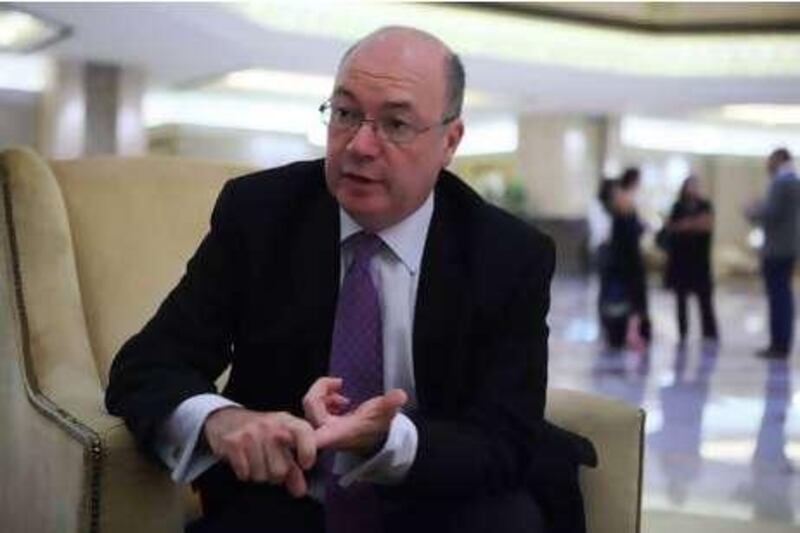ABU DHABI // The UAE has played a vital role in making UN sanctions against Iran work, according to Britain's Middle East minister. Alistair Burt was speaking to The National after a meeting of a joint UK-UAE task force on Wednesday.
"The UAE has played a major part in implementing the sanctions that have been imposed to encourage Iran to follow a different course in relation to its nuclear policy," he said. He called the country's efforts on the subject "extraordinarily commendable". The UAE announced in August that it would implement the latest round of UN sanctions against Iran. As a result, banks now have to tell the Central Bank how much money their customers have sent to the Islamic Republic.
Wednesday's meeting in Abu Dhabi was the task force's second since it was formed in July. Mr Burt, under-secretary of state at the Foreign Office, also held five hours of discussions with Dr Anwar Gargash, the Minister of State for Foreign Affairs. During the task force meeting the UAE urged Britain to ease visa requirements for its citizens. Emiratis travelling to the UK have to provide bank statements, while UK citizens are given visas on arrival in the UAE.
Ian Wood, the UK's deputy ambassador to the UAE, said his country would consider easing the requirements. "We've listened to their concerns," he said. "We're going to go back and consider what they said." Mr Burt said the UK had made closer ties with the UAE a key priority of its so-called "Gulf initiative", a comprehensive effort to boost relations with the region. "The UK is working right across its departments ? to develop relationships with the Gulf, as a whole, and individually with each nation."
However, Mr Burt emphasised that the task force represented a special effort between the two countries. "It's going across trade, defence, common foreign policy, security, culture, education. That's what makes this different. We are not replicating the UK-UAE task force in every single case." In what is considered a signal of the UK's interest in the country, David Cameron included the Emirates on his inaugural foreign trip as prime minister. Despite its historical ties to the region, and the UAE in particular, the UK has lost power and influence in the Gulf over recent decades. Emile Hokayem, senior fellow for Gulf security at the International Institute for Strategic Studies and a former political editor of The National, said the UK was retrenching after a three-decade period of decline in the region. "On the strategic side, it became mostly a follower of the US. On the economic side it was mostly a very opportunistic approach." He said the decision to focus on the UAE was no coincidence. "For the UK government, resources are shrinking and the budgets are shrinking. They need to make choices; India and the Gulf are their two targets." The task force's inaugural meeting focused largely on boosting bilateral trade from £7.5 billion (Dh41bn) a year to £12bn by 2015. But according to Dr Gerd Nonneman, a Gulf politics expert at Chatham House, it has wider aims. He said the task force was part of a strategy to focus on relations with developing and emerging powers. The UAE was high on that list. "They [the UK] realised that the UAE, under Abu Dhabi's driving ambition, is emerging as an absolutely key actor in the region. Dr Nonneman said that the UK had ground to make up on other nations. "They've realised that others, including the US, the French and the Koreans, have been trying to make something of this new emerging regional economic as well as political power." The task force will meet again in London in November. smclain@thenational.ae






